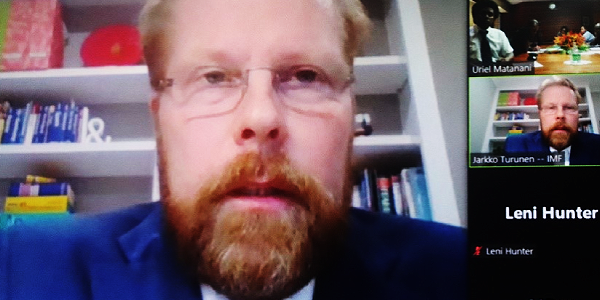THE COVID-19 pandemic and its economic fallout has hit hard on the country’s economy.
Head of International Monetary Fund (IMF) to Solomon Islands Jarkko Turunen during the IMF virtual press conference yesterday said while the government stringent measures are required to contain and suppress the pandemic to protect lives, these measures will also increase the risk of economic losses.
“Strong and timely containment measures have successfully prevented a domestic Covid-19 outbreak. The Solomon Islands’ economy has nevertheless been hit hard by the pandemic,” he said.
He said following a contraction in 2020, real GDP growth is projected to improve to 0.4 percent this year, commencing a gradual recovery underpinned by relaxation of Covid-19 related restrictions and construction activity.
Mr Turunen said the fiscal deficit is expected to widen this year, from 2.4 percent of GDP in 2020. Foreign reserves remained robust at about 11.5 months of prospective imports (US$708 million) as of end-October 2021, reflecting inflows from development partners, subdued imports, and the new allocation of IMF Special Drawing Rights (SDRs).
Further to that, he said the inflation has been muted but is expected to increase. Labor market conditions have deteriorated, and the pandemic is likely to have disrupted progress in poverty reduction and human development.
However, he said economic policies should focus on ensuring a durable recovery in the short term through transparent and well-targeted support to the most vulnerable households and businesses and further efforts to avoid any delays in government payments.
“To make room for fiscal support to the economy and to address large development spending needs, expenditures in areas with weak transparency and governance practices, including Constituency Development Funds, should be contained. Progress in advancing the Tax Administration Bill, National Payment System and introduction of procurement regulations is welcome, but timely and effective implementation are critical for success.
“Post-pandemic policies should focus on rebuilding fiscal buffers to enhance resilience to shocks and address spending needs for progress towards Sustainable Development Goals over the medium term.
“Further reforms are needed to improve fiscal governance, advance public financial management and establish a comprehensive medium-term revenue strategy to maintain fiscal sustainability. Modernizing tax administration and introducing a Value Added Tax are important first steps towards comprehensive tax reforms.
“Maintaining a strong reserves buffer will continue to support macroeconomic stability. Financial sector reforms should be aimed at increasing private sector credit growth, as well as continued improvements in financial development and inclusion. Strengthening the AML/CFT framework and implementation would help safeguard financial stability.
“Generating new sources of growth requires effective investment in human capital and infrastructure, structural reforms and efforts to improve the business environment.
“Accelerating digital and green growth can foster longer-term economic transformation and improve resilience. Strengthening enforcement of governance standards, improving transparency, including for pandemic-related spending, and advancing the anti-corruption agenda remain crucial,” Turunen said.
By FOLLET JOHN
Newsroom, Honiara









